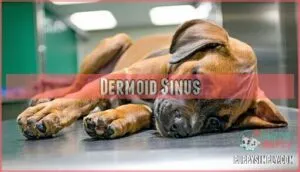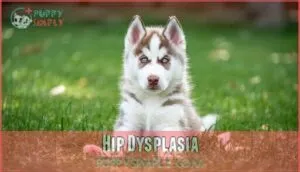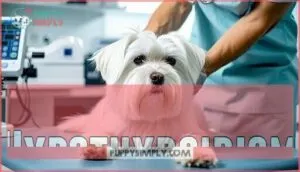This site is supported by our readers. We may earn a commission, at no cost to you, if you purchase through links.

Dermoid sinus affects 8-10% of Ridgebacks and requires immediate surgical removal, while hip dysplasia strikes nearly 25% of the breed.
Their autoimmune tendencies mean thyroid problems pop up frequently too.
Smart owners invest in extensive coverage that reimburses up to 90% of vet bills for breed-specific issues.
Without insurance, you’re gambling with your wallet every time your Ridgeback shows symptoms.
The right plan becomes your financial safety net when genetic surprises surface – and trust me, they usually do with this breed.
Table Of Contents
- Key Takeaways
- Origins of The Rhodesian Ridgeback
- Common Health Issues in Rhodesian Ridgebacks
- Frequently Asked Questions (FAQs)
- Do Rhodesian Ridgebacks need a veterinary checkup?
- Who is Rhodesian Ridgeback rescue?
- Are Rhodesian Ridgebacks good dogs?
- What is a Rhodesian Ridgeback?
- Do Rhodesian Ridgebacks need a lot of exercise?
- Are Ridgebacks good family dogs?
- What is the most expensive dog breed for pet insurance?
- How much should pet insurance cost for a dog?
- What is the price of Rhodesian Ridgeback dog?
- Is $5000 enough for pet insurance?
- Conclusion
Key Takeaways
- You’ll face expensive genetic conditions like dermoid sinus (8-10% of Ridgebacks) and hip dysplasia (25% of the breed) that can cost thousands without coverage.
- You should invest in comprehensive insurance that reimburses up to 90% of vet bills for breed-specific issues, as treatment costs often exceed $3,500.
- You can’t predict when genetic health problems will surface, but Ridgebacks’ African hunting heritage makes them prone to autoimmune issues and thyroid problems.
- You’ll need insurance before symptoms appear, as premiums typically range $30-$100 monthly but protect against unexpected veterinary bills that easily exceed $5,000.
Origins of The Rhodesian Ridgeback
Your Rhodesian Ridgeback’s story begins in the rugged landscapes of southern Africa, where necessity birthed one of history’s most remarkable dog breeds.
European settlers crossed their hunting dogs with native Khoikhoi dogs, creating the perfect blend of courage and loyalty.
Where European hunting dogs met African resilience, an extraordinary breed was born.
These lion hunters earned their reputation tracking Africa’s most dangerous predators while protecting families from threats. Originally called the African Lion Hound, this breed’s African ancestry runs deep.
The Renaissance Hound moniker reflects their versatility—equally skilled at hunting, guarding, and companionship. In 1922, breeders established the first breed standard, cementing the Rhodesian Ridgeback’s place in dog breed history.
This dog breed origin story showcases Africa’s influence on creating an exceptional guardian. Understanding your Ridgeback’s heritage helps explain their independent nature, protective instincts, and unwavering loyalty that makes them such devoted family companions today.
Common Health Issues in Rhodesian Ridgebacks
While Rhodesian Ridgebacks are generally healthy dogs, they’re prone to several genetic conditions that can lead to expensive vet bills.
Understanding these common health issues helps you choose the right insurance coverage and prepare for potential medical costs throughout your dog’s 10-12 year lifespan.
Dermoid Sinus
Watch out for dermoid sinus in your Ridgeback—this genetic condition affects up to 10% of puppies.
Sinus detection involves checking for lumps along the spine that connect to deeper tissues. Without surgical correction, infections can spread to the spinal cord.
Post-op care guarantees complete healing after sinus management. Rhodesian ridgeback insurance helps cover these genetic conditions, making dog insurance essential for pet insurance coverage.
These dogs were originally bred for hunting, showcasing their versatility. They require complete healing and proper care to thrive.
Hip Dysplasia
With up to 15% of Ridgebacks affected by genetic predisposition, hip dysplasia represents one of the most common breed-specific risks you’ll face.
Hip dysplasia strikes one in seven Ridgebacks—early detection saves thousands in treatment costs.
This condition shows varying severity levels, from mild joint laxity to debilitating arthritis requiring surgical options like total hip replacement.
Early detection through radiographic screening gives you more treatment choices and better outcomes, and lifestyle adjustments including weight management and controlled exercise can substantially reduce symptoms.
Since treatment costs often exceed $3,500, securing rhodesian ridgeback insurance coverage for genetic conditions becomes essential before symptoms appear, and many owners explore options for pet insurance coverage given this risk.
Hypothyroidism
After joint problems, hormone imbalances can sneak up on your rhodesian ridgeback breed.
Hypothyroidism affects 3-5% of Ridgebacks when their thyroid glands slow down, causing weight gain and fatigue.
This breed predisposition means thyroid screening becomes essential around age four.
Hormone replacement therapy with levothyroxine helps restore energy levels, but ongoing dog insurance cost averages $300 annually for weight management and monitoring.
Many owners explore insurance options for dogs with hypothyroidism.
- Watching your energetic hunting dog become sluggish and overweight despite normal eating
- Seeing patchy fur loss and skin infections develop from compromised immunity
- Facing $250-400 yearly treatment costs without rhodesian ridgeback health coverage through pet insurance
Frequently Asked Questions (FAQs)
Do Rhodesian Ridgebacks need a veterinary checkup?
Like a faithful compass guiding you through uncharted waters, your Ridgeback absolutely needs regular vet checkups.
These athletic dogs face genetic health risks like hip dysplasia and dermoid sinus that require professional monitoring to catch early, ensuring they receive the care needed to address potential issues like dermoid sinus.
Who is Rhodesian Ridgeback rescue?
You’ll find several Rhodesian Ridgeback rescue organizations that help these majestic dogs.
Rhodesian Ridgeback Rescue, Inc. operates throughout the USA and Canada as an all-volunteer, non-profit organization, while regional groups handle specific areas nationwide.
Are Rhodesian Ridgebacks good dogs?
You’ll find Rhodesian Ridgebacks make excellent dogs for experienced owners.
They’re loyal, dignified companions who bond deeply with families.
However, their strong-willed nature and protective instincts require consistent training from puppyhood, making them a good fit for owners who can provide consistent guidance.
What is a Rhodesian Ridgeback?
Picture meeting Africa’s legendary "lion dog" – that’s your Rhodesian Ridgeback.
You’ll recognize this athletic breed by their signature backward-growing hair ridge along their spine.
They’re powerful, wheaten-colored hunters originally bred to track lions.
Do Rhodesian Ridgebacks need a lot of exercise?
Yes, Rhodesian Ridgebacks need daily exercise to stay healthy and happy.
They’re natural hunters with high energy levels, so you’ll want to provide vigorous activities like jogging or hiking to keep them satisfied.
Are Ridgebacks good family dogs?
Ridgebacks make excellent family dogs when properly trained – about 85% of owners report strong family bonds.
You’ll find they’re naturally protective yet gentle with children, though their size requires supervision around toddlers.
What is the most expensive dog breed for pet insurance?
You’ll likely pay the steepest premiums for giant breeds like Bullmastiffs, Newfoundlands, and Great Danes. These powerhouses face serious health risks that insurance companies know cost serious money.
How much should pet insurance cost for a dog?
Pet insurance costs will make your wallet weep tears of joy when emergencies strike.
You’ll typically pay $30-$100 monthly, depending on your dog’s age, breed, and location.
It’s worth every penny for peace of mind.
What is the price of Rhodesian Ridgeback dog?
You’ll find purchasing a Rhodesian Ridgeback costs between $1,000 and $3,500, depending on the breeder’s reputation, your pup’s pedigree, and location factors.
Is $5000 enough for pet insurance?
You’ll need more than $5000 for thorough coverage.
$5000 barely scratches the surface, barely covers basics, barely handles emergencies.
Most pet insurance doesn’t cost $5000 annually – it’s typically monthly premiums ranging $30-135, protecting against unexpected veterinary bills that can exceed $5000 easily, which is why having thorough coverage is important.
Conclusion
Protecting your Ridgeback is like building a fortress around your family’s heart – you can’t predict when genetic storms will hit, but you can prepare for them.
Smart rhodesian ridgeback pet insurance gives you peace of mind when dermoid sinus or hip dysplasia strikes.
Don’t let breed-specific health issues drain your savings. Choose thorough coverage that handles the unexpected, because your loyal companion deserves the best care without financial stress weighing you down.









